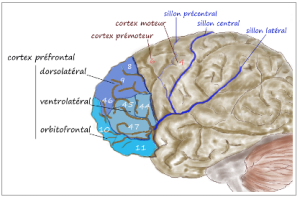Bipolar disorder is a brain disorder that causes a rapid or sudden fluctuation in mood. While we all experience varying degrees of moodiness, bipolar disorder is much more dramatic that the normal ups and downs. It is known to be a hereditary gene, or is passed on through a family. Children with a direct family member with bipolar disorder are more likely to develop than those who do not have family with the disorder, but most do not develop the illness.
In a study done by a group of doctors led by Dr. Stephen Strakowski for a peer review, the doctors identified prefrontal activation in bipolar subjects which was not present in healthy subjects. The study concluded that due to the activation in bipolar subjects was a result of different “functional neuroanatomic approaches,” or simply a different way of thinking. The figure below is the results of the manic bipolar subjects, the orange indicates increased activation, blue indicates decreased.



I think my favorite part of this article, even though it was fairly brief, was that you found a study that identified bipolar patients as people who “just think differently,” and not people who are insane, overly moody, or weird. Do you think scientists could apply that same way of thinking to disorders like schizophrenia or OCD? While I don’t think we can get the whole world thinking like that, I think it’s a very objective and scientific view, and I’m gad you included it in your post.
Interesting post and topic, but I think you could have elaborated/addressed the different aspects of bipolar disorder in greater depth. We talked a bit about altering genes and the emerging abilities to do so. I wonder if genes could be altered to rid someone of bipolar disorder. We’ll have to wait and see.
Its really interesting that this disorder can be passed down from parent to child, but i feel that you could’ve elaborated more on the brain scan to prove your point.
I wonder what it’s like to grow up with a family member or friend who has a bipolar disorder because I know it’s such a difficult thing to deal with having so many mood shifts. I didn’t know it was heredity though. I liked the diagrams and pictures that you used to incorporate into your post and I’m glad I learned something from it. Here’s an article that I found that builds on the topic of bipolar disorder.
http://www.nimh.nih.gov/health/topics/bipolar-disorder/index.shtml